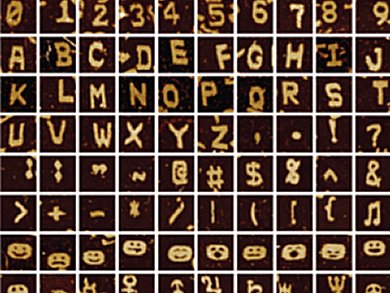Creating nanostructures with complex, finite shapes by carving synthetic nucleic acid strands represents a challenge. Modular approaches based on self-assembly of DNA tiles have been used to obtain simple bi-dimensional shapes. By implementing this technique, Bryan Wei, and colleagues, Harvard University, USA, managed to produce complex arbitrary DNA shapes at high speed.
The team developed a strategy based on 42-base single strands DNA tiles possessing four different binding domains which allowed interactions to four other neighbouring strands during DNA self-assembly. A computer program provided a graphic interface to draw the desired shapes and instructed a robotic handler to pick and mix the tiles. When appropriate subsets of them were selected, mixed together and allowed to self-assemble, complex two-dimensional DNA shapes were efficiently produced. Latin letters, Arabic numbers, Chinese characters, emoticons and astrological symbols are just an example.
Image: Examples of 150 nm tall nanoscale drawings made from DNA. © Nature
- Complex shapes self-assembled from single-stranded DNA tiles,
B. Wei, M. Dai, P. Yin,
Nature 2012, 485 (7400), 623–626.
DOI: 10.1038/nature11075




